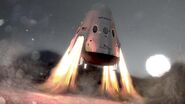
The headquarters of the Canadian Agency for Space Exploration.
The Canadian Agency for Space Exploration (CASE; French: Agence canadienne pour exploration spatiale, ACES) is the governmental body responsible for the civilian space program as well as aeronautics and aerospace research. The agency is headquartered at the John H. Chapman Space Centre in Longueuil, Quebec. The agency has an annual budget of C$4.5 billion, the 6th largest budget of any space agency in the world.
CASE's space flight programme includes human spaceflight (through participation in the International Lunar Station and Mars International Colony programme as well as manned missions to asteroids); the launch and operation of unmanned exploration missions to other planets and the Moon; Earth observation, science and telecommunication and designing launch vehicles.
Launch vehicle fleet[]
CASE has a fleet of different launch vehicles in service with which it competes in all sectors of the launch market. CASE's fleet consists of three major rocket designs: Spirit II, Confederation II and Centaur III. Rocket launches are carried out at CASE's Canso Space Centre.
Spirit II[]

The maiden flight of the Spirit II at Fort Churchill, Manitoba.
The Spirit II rocket is CASE's primary launcher. It has been in service since 2039 and replaced Spirit I. The Spirit II has a payload capacity of 180 tonnes to LEO, placing it in the category of heavy lift space launch vehicle, and feature a restartable second stage to allow more complex missions. The main spacecraft carried by the Spirit II is the Aurora II.
Confederation II[]

A Confederation II rocket carrying Expedition 76 prepares to launch.
The Confederation II rocket is a medium-lift launch vehicle, with a payload of 15 tonnes to LEO, which was brought into CASE service in October 2034. The Confederation II rocket is used by CASE to put heavier satellites into low-earth orbit, as well as servicing the North American Space Station.
The Confederation II rocket is also used to provide the space agencies of Australia, New Zealand and Mexico with means to service the various stations in LEO. The Confederation II rocket also constitutes Canada's contribution to the Joint International Supply Mission, providing resupply capabilities to all manned space stations on a regular basis.
Centaur III[]
Centaur III is CASE's launch vehicle for small satellites. It is capable of launching a 1.5 tonnes into low-earth orbit.
Facilities[]
- John H. Chapman Space Centre (CSC) in Longueuil, Quebec contains the Canadian Mission Control Center, where all flight control is managed for crewed space missions. CSC is the lead CASE center for activities regarding the International Space Station and also houses the CASE Astronaut Corps that selects, trains, and provides astronauts as crew members for Canadian government and international space missions. (JSC, ESOC, EAC) [Astronaut Corps, Flight Control]
- David Florida Laboratory (DFL) in Ottawa, Ontario is CASE's main technology development and test centre for unmanned spacecraft and space technology. DFL also oversees the CASE Deep Space Network. (ESTEC, JPL, GSFC, ESAC) [Rovers, Unmanned Spacecraft]
- Canso Space Centre (CaSC) in Canso, Nova Scotia has been CASE's primary launch center of human spaceflight. (KSC) [Launch Site]
- Space Centre (GSC) in Saskatoon, Saskatchewan is CASE's centre for dedicated to research involving earth observation data taken from satellites, among other specialised activities. (ESRIN, GSFC) [Earth observations]
- Fort Churchill Space Centre (The Fort) in Churchill, Manitoba serves as CASE's rocket development and testing facility. (MSFC, SSC) [Rocket development, rocket engine test facility]
- Marc Garneau Research Centre (GaRC) is considered CASE's premier site for aeronautical research, but has also tested space hardware at the facility. It is jointly operated with DFL, RCAF, Bombardier and various leading Canadian universities. (AFRC, LaRC) [Aeronautical research]
- Larken Kerwin Research Centre (KRC) in Abbotsford, British Columbia primarily focuses on research and technology in aeronautics, spaceflight, and information technology. The center's core competencies include air-breathing and in-space propulsion and cryogenics, communications, power energy storage and conversion, microgravity sciences, advanced materials, intelligent/adaptive systems and thermal protection. (ARC, GRC) [Space technology research]



